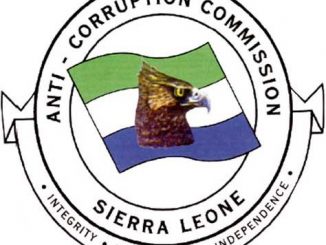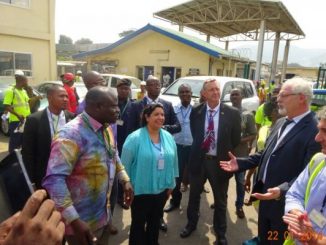
By Rebecca Perlman
For the first time since Ebola struck, the slogan “Sierra Leone is open for business” appears to be more than just an uplifting soundbite. With two major trade delegation visits in the past six months, several high profile international investment forums on the Mano River Union and a Post-Ebola Recovery Strategy that prioritises private sector-led growth, the signs are certainly encouraging.
Ten years on from the end of its civil war, Sierra Leone was one of the fastest growing economies in the world. And it is easy to see why. The country’s shores are lined by white sand beaches rivalling the Seychelles, mining opportunities extend well beyond the country’s famous diamond reserves, and the huge potential in renewable and non-renewable energy was beginning to be realised. Taken together with largely untapped potential in agriculture and fisheries, one need not look far for investment opportunities.
As levels of inward investment grew following the end of the war, the Government increasingly found itself faced with what President Koroma has referred to as “a phalanx of lawyers and accountants on one side of the [negotiating] table, outnumbering our own side ten to one.” The impact of this imbalance between the Government and international investors has stretched beyond the boardroom to the very heart of Sierra Leone’s development agenda. Foreign investment, and the increased prosperity that comes with it, can help Sierra Leone reclaim the levels of growth enjoyed before the Ebola crisis. In the longer term however the Government’s focus on getting “a fair deal” in negotiations with international investors will be critical to translating wealth creation into sustainable, inclusive growth for the country as a whole. This was the case before the Ebola outbreak and it is all the more important as the country moves from crisis to recovery.
The role of commercial contract negotiation in advancing Sierra Leone’s development lies at the heart of international law firm Herbert Smith Freehills (HSF)’s Fair Deal Sierra Leone free legal assistance programme. Set up in 2010, the programme seeks to help redress the imbalance at the negotiating table and support the Government of Sierra Leone with increasing levels of inward investment. Over the past 6 years, HSF has provided more than £2million worth of free legal advice to the Government on commercial contracts, disputes, legislation and policy. During the Ebola crisis, this included pro bono assistance on force majeure and material adverse change issues as well as holistic advice on investor relations and crisis management. More recently, HSF produced Sierra Leone: An Investor’s Guide together with Standard Chartered Bank and Prudential plc. The Guide provides an independent, private sector perspective on Sierra Leone’s investment landscape with the aim of rebuilding confidence in the country as an investment destination.
We have seen that the right sorts of deals with the right kind of investors can support development outcomes from water supply to education and skills development. For instance, agricultural investments with smallholder programmes can both focus on skills and development training, and provide markets for smallholders, stimulating further production and helping commercial businesses reach more scale more quickly. One example is Carmanor Ltd, a UK firm which has invested in African Lion Agriculture with Sierra Rutile. Carmanor has installed a palm oil mill to mill fruits it purchases from smallholders that currently lack access to market and is developing a 13,000 hectare estate with port facilities over the next 10 years.
The post-Ebola recovery effort has emphasised the need for a strong private sector in Sierra Leone and the importance of the Government’s relationship with it. The Government’s renewed focus on improving infrastructure, broadening the tax base and creating jobs for the people of Sierra Leone reveals a desire to reflect on what could have been done differently in the period leading up to the crisis and to reclaim the country’s pre-crisis growth. In order to achieve this, Sierra Leone will need to rebuild investor confidence abroad and at home.
Promotion of the country’s investment opportunities is a good starting point. Recent examples include an investment forum hosted by the Dutch Ministry of Foreign Affairs in November last year and the Sierra Leone Investment and Export Promotion Agency (SLIEPA)’s new “Sierra Leone Back to Growth” investment promotion video. However investors will want more than an overview of the many opportunities within Sierra Leone. The investment framework and the perceived and actual ease of doing business in the country will be critical to increasing levels of inward investment and to reclaiming the trajectory set by the Agenda for Prosperity.
There does currently appear to be greater political will for reform in Sierra Leone. As one minister recently stated, “we should never waste a good crisis”. The Government seems determined not to do that. In particular, SLIEPA is looking to centralise the country’s fiscal and non-fiscal regimes into one easy-to-access investment code. The Government is also considering specific reforms to the agribusiness investment framework. Another key focus is on the standardisation of processes across different Government Ministries, Departments and Agencies, including the development of model form documents for use in tenders and deal negotiations.
Sierra Leone now stands on the threshold of the next chapter in its history. Effective long-term investment will be critical to securing the country’s future and preventing history from repeating itself. International supporters stand ready to assist as the Government capitalises on the increased political will for change so that the private sector can come into its own in the long-term recovery effort, identifying and driving the opportunities that Sierra Leoneans and leading businesses stand ready to grasp.
Rebecca Perlman is a lawyer at leading global law firm Herbert Smith Freehills (HSF). In 2014, Rebecca was seconded to the Office of the President of Sierra Leone through HSF’s award-winning Fair Deal Sierra Leone pro bono programme. Rebecca represents HSF on the UK’s City Ebola Taskforce, which was formed following a private sector briefing by the UK Foreign and Commonwealth Office (FCO) on its actions to support the Government of Sierra Leone during the Ebola crisis.
The Taskforce has produced a new Investor Guide for Sierra Leone, in collaboration with the FCO, UK Department for International Development (DFID) and the GoSL. The Guide was drafted by a team of Herbert Smith Freehills lawyers, together with Standard Chartered Bank and Prudential plc, and was launched by President Koroma of Sierra Leone at the United Nations International Ebola Recovery Conference in July 2015. The Guide is available for download at http://www.herbertsmithfreehills.com/insights/guides/sierra-leone-an-investors-guide.




